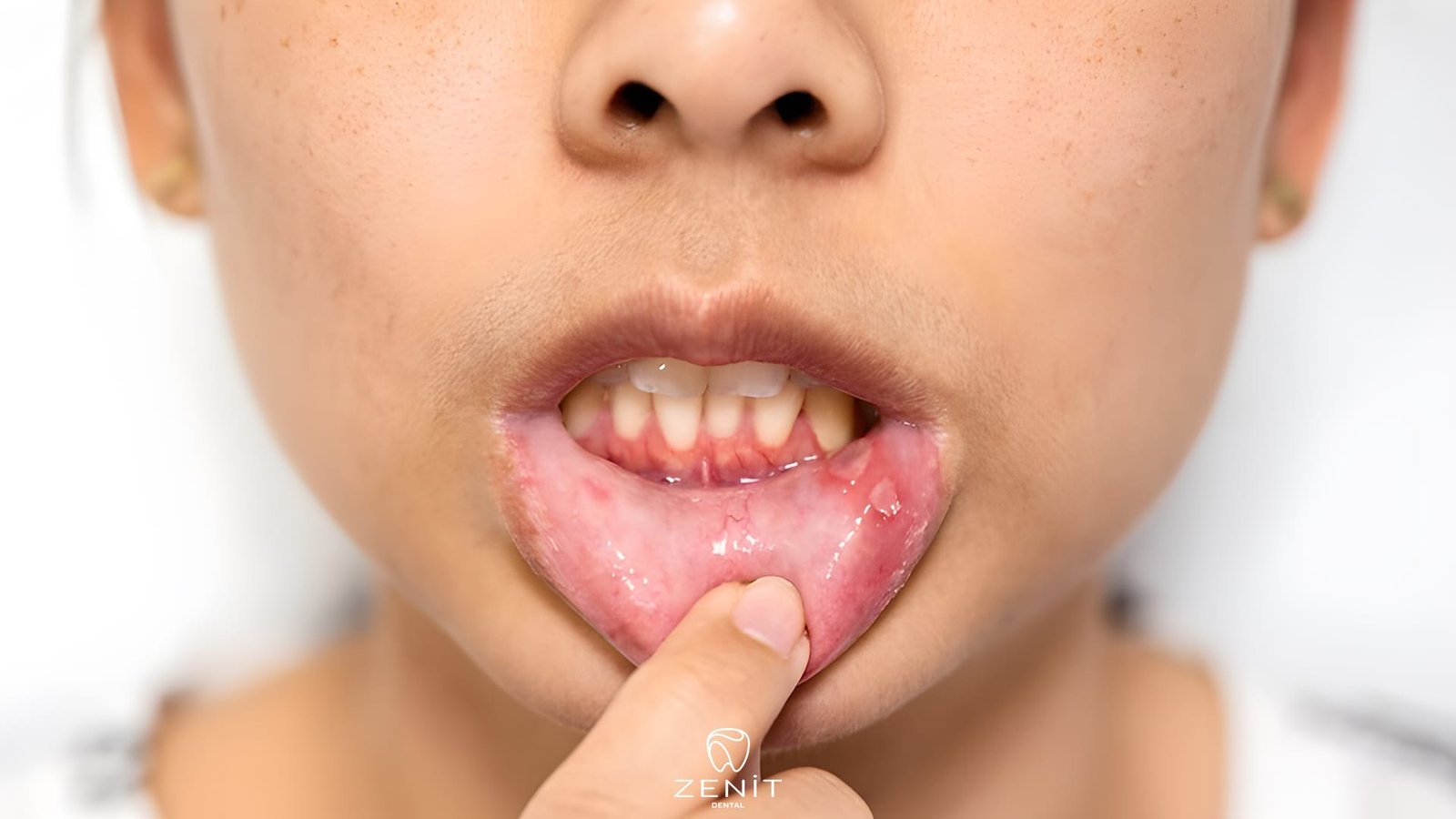Why Do Mouth Ulcers Occur?
Mouth ulcers, a common oral health issue encountered by people, are painful sores that can cause both physical and emotional discomfort. They appear as white or yellow, round or oval lesions on the oral mucosa, tongue, gums, or palate. They often create a sense of pain and discomfort during eating, drinking, and even speaking, negatively impacting daily life. While mouth ulcers typically heal on their own within 1 to 2 weeks, treatment and preventive measures can be taken to alleviate the discomfort and expedite the healing process during this period.
While it is difficult to pinpoint the exact causes of mouth ulcers, scientific studies and observations suggest that various factors can trigger their formation. Stress is a primary factor among these. Stress can weaken the body’s immune system, potentially laying the groundwork for mouth ulcer development. Under stress, the body may not effectively operate its defense mechanisms, making the oral mucosa more susceptible to injury.
Immune system weakness is another factor that influences mouth ulcer formation. Individuals with a weakened immune system are more vulnerable to infections and other health issues. Therefore, mouth ulcers are more likely to occur in individuals with compromised immune systems. Immune system weakness can result from various factors, such as infections, certain diseases, or side effects of medications. Strengthening and supporting the immune system can play a significant role in reducing the occurrence of mouth ulcers.
Deficiencies in vitamins and minerals are another cause of mouth ulcers. Particularly, deficiencies in folate, vitamin B12, iron, and zinc can lead to a lack of essential nutrients required for the healthy healing of the oral mucosa. Therefore, increasing the intake of these vitamins and minerals through a balanced diet can help prevent mouth ulcers.

Additionally, food sensitivities can contribute to the development of mouth ulcers. Some foods can trigger allergic reactions, leading to the formation of mouth ulcers. Individuals with sensitivities to certain foods such as chocolate, dairy products, nuts, legumes, and spicy foods should be cautious when consuming these items.
Dental and oral health issues play a critical role in the development of mouth ulcers. Poor oral hygiene, gum diseases, and inadequate brushing or flossing can increase the presence of bacteria in the mouth, creating a conducive environment for mouth ulcer formation. Therefore, regular tooth brushing, flossing, and routine dental check-ups can help reduce the occurrence of mouth ulcers.
Some diseases can also affect the formation of mouth ulcers. For example, autoimmune diseases like Behçet’s disease, celiac disease, and Crohn’s disease can frequently lead to the presence of mouth ulcers. Effective treatment and management of such diseases can reduce the occurrence of mouth ulcers.
Mouth ulcers typically heal on their own within 1 to 2 weeks but can be painful and uncomfortable during this period. Specialized medications designed for mouth sores can be used to expedite the healing process. These medications help reduce the pain and inflammation of mouth ulcers. Creams containing hydrocortisone, in particular, can be effective in this regard.
Mouth rinses can also help reduce oral bacteria. Mouthwashes containing chlorhexidine assist in reducing oral bacteria and can expedite the healing process of mouth ulcers.
Drinking plenty of fluids can aid in the healing of mouth ulcers. Adequate fluid intake helps keep the oral wound moist and accelerates the healing process.
Supplements of vitamin D can help prevent mouth ulcers caused by vitamin D deficiency. Vitamin D contributes to the health of the oral mucosa. If you have a deficiency in vitamin D, you can consider supplementation under the guidance of a healthcare professional.
Taking preventive measures can also help prevent the formation of mouth ulcers. For instance, reducing stress can aid in preventing mouth ulcers. You can manage stress through stress-reducing techniques such as yoga, meditation, exercise, or relaxation methods.

Eating a healthy diet can help prevent vitamin and mineral deficiencies. Additionally, consuming plenty of fruits, vegetables, and fiber-rich foods helps maintain the health of the oral mucosa.
Regularly brushing your teeth and using dental floss helps keep oral bacteria under control and reduces the occurrence of mouth ulcers.
Smoking and excessive alcohol consumption can trigger mouth ulcers. Therefore, avoiding these habits is important for maintaining oral health.
In conclusion, mouth ulcers are common and uncomfortable sores that can appear inside the mouth. While their exact causes are not fully understood, factors such as stress, weakened immune system, vitamin and mineral deficiencies, food sensitivities, dental and oral health issues, and certain diseases can trigger the formation of mouth ulcers. There are various treatment methods and preventive measures available to expedite the healing process and prevent mouth ulcers.

Therefore, it is important to pay attention to these factors to maintain oral health and reduce the occurrence of mouth ulcers. Taking proper care of your oral health is a reflection of your overall well-being. Therefore, the measures taken to minimize these discomforting issues can enhance your quality of life and make daily living more comfortable.

Comments are closed